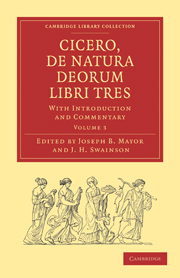PREFACE
Published online by Cambridge University Press: 05 October 2010
Summary
In concluding a work which has cost me many years of labour, it may not be out of place to state why I first undertook it and what I have tried to accomplish. Believing that the entrance of Christianity into the world is the central fact of man's history, the key to all that preceded and all that has followed it, I have always esteemed it to be the highest office of classical scholarship to throw light upon the state of thought and feeling in the two great nations of antiquity at the time of the birth of Christ. It is as a contribution to such an inquiry that the treatise on the Nature of the Gods seems to me to possess a unique interest and value; not because Cicero was himself the most original, the most earnest, or the most religious thinker of his time; but because he, more than any other, reflects for us the best tone of his time, because he represents to us most truly its highest level of intelligence and morality. To what extent then do we find in his writings any anticipation of the religion which was to establish itself, not in Judaea alone but in Greece and Italy also, within a hundred years of his death? We find in the first place the way prepared for Christianity by the abandonment of the old polytheism.
- Type
- Chapter
- Information
- Cicero, De Natura Deorum Libri TresWith Introduction and Commentary, pp. iii - viPublisher: Cambridge University PressPrint publication year: 2010First published in: 1885



